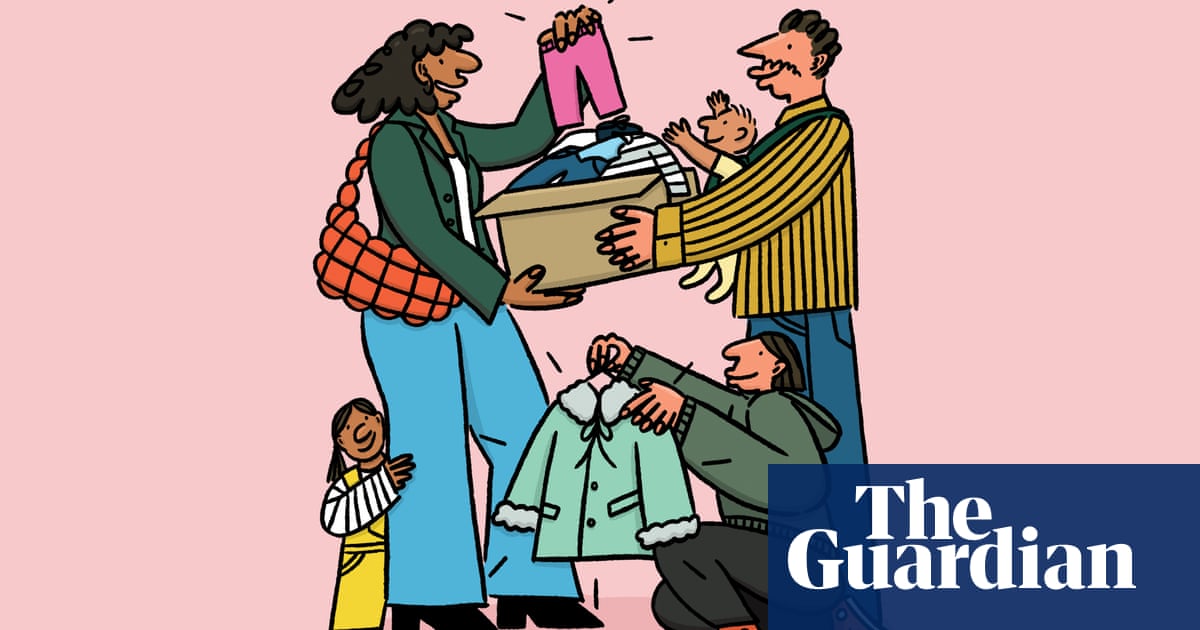
Shop secondhand
Charity shops can be a goldmine for bargains – use the Charity Retail Association’s online search page to find ones that stock children’s clothes, or in London, head to one of FARA’s 14 stores that specialise in kids’ clothes. Again you can find them listed online.
Secondhand sales events can also offer great savings – NCT’s nearly new sales (free for everyone but NCT members get 15 minutes’ early access) and Mum2Mum Market (£2 entry an adult, children go free) take place regularly across the country.
Online, secondhand sites such as Vinted, Depop and Facebook Marketplace have the biggest choice. Using AI technology, Faircado will help you find the best deals across 50 platforms selling secondhand products.
Create a list of things you need and stick to it, says Evoléna de Wilde d’Estmael, the chief executive and co-founder of Faircado. “This will help you avoid buying impulsively.” If you can’t find an item at that moment and don’t need it immediately, you can set a digital alert in the app.
D’Estmael recommends cross-checking with retail prices to see what is a good deal and checking seller’s reviews before buying.
Ruby Blaken, the founder of the secondhand and ex-stock clothing business Second Snuggle, says: “If you want to ensure your items are checked for marks and described well, check out the Instagram account @theclubpreloved, which showcases a wonderful collection of independent businesses selling quality secondhand pieces.”
Get swapping
Check out sites such as Facebook or Nextdoor to find local in-person clothes swaps, or host one yourself either at home or at your child’s nursery or school.
“Invite a group of parents and focus on quality over quantity by setting a limit,” says Alexandra Birtles, the co-founder of In Good Company, a free app for finding ethical and sustainable businesses and experiences. “For example, ask people to bring between two and 10 items, all in good condition. This ensures that everyone walks away with valuable, wearable items of clothing.”
Buy out of season
One of the best ways to get good deals is buying items out of season, especially when it comes to big-ticket items. For instance, winter coats are often discounted in high street shops from about February or March with up to 50% off.
This also applies to buying secondhand pieces. “You can often find great coats in the summer months when people don’t want to store them,” Blaken says. “Keep a list on your phone of items you know you need to buy for the coming season.”
Sell on clothes
While it’s good to be a little cautious about buying ahead when you are unsure on sizing or changing preferences of your child, the good news is that clothes in good condition, or unused, can easily be resold on secondhand platforms.
Good photos and accurate descriptions are key to success here. “Make sure to iron items, have a clear background and take the photo with plenty of light,” Blaken says.
Bundling smaller items such as babygrows or T-shirts is often a quicker and easier way to sell cheaper or smaller pieces. For clothes in less good condition, taking them to stores that offer payback recycling schemes is a good option. Some shops offer incentives for recycling old clothes and shoes, such as H&M and John Lewis, which give a £5 voucher, and Asda, which offers 10% off any upcoming clothing purchases.
Extend clothes’ life cycle
Looking after clothes correctly is one of the easiest ways to maximise their longevity both while your child needs them and for selling on. “Pay attention to care labels to make sure you’re washing correctly and store clothes properly, avoiding stuffing them in overcrowded drawers or cupboards,” D’Estmael says.
If there are stains or small holes, you can rescue the item and maybe even improve it in the process. “It isn’t as scary as it sounds,” says Blaken. “I am not great at sewing but have managed to save many trousers by patching knees (there’s lots of fun patches with sequins and patterns you can buy and sew on) or tie-dying plain items to cover up marks.”
Try renting
For babies and small children growing at a rapid rate, membership services such as Thelittleloop and Bundlee are a way to save money on quality clothes. Loop’s prices start at £18 a month for about seven items and insurance, plus £3.29 for each delivery, while Bundlee charges from £13 a month for five items, including insurance and delivery.
“You choose the clothes to rent, and when they outgrow the items, you simply send the clothes back for the next size up,” Birtles says.
If you need something for a one-off activity like fancy dress, a sporting activity or camping, ask around to see who may have something or check out the sharing app Olio or your local Library of Things (Ethical Consumer’s online directory lists nearly 100 across the UK). Some schools have lending banks for these types of items, too, and if yours doesn’t, you could suggest setting one up.
Make clothes work harder
When chosen wisely, the clothes themselves can also help you save money. “Buy unisex or neutral items so you can easily pass them down to your other children,” Blaken says.
Whether you are buying new or secondhand, choosing brands that produce high-quality, hard-wearing items is often better value in the long-run too. “Ask other parents for recommendations who can speak from experience,” D’Estmael says.
Or look for multipurpose items. “You can often save money by buying items like three-in-one coats that incorporate a raincoat, gilet and fleece,” Blaken says. Some high street shops such as Marks & Spencer make vests with popper fastenings and fold over cuffs that mean you can buy two sizes in one and save buying so frequently.
Shop around for uniforms
Recently the Observer found that parents are routinely paying more than double the price for branded school uniforms than the cost of similar items offered by supermarkets and high street stores. While some schools mandate the wearing of some branded items, you can save money by buying as many non-branded items as possible. Aldi and Lidl’s £5 uniform bundles, which tend to include two polo shirts, one sweatshirt and a choice of trousers, skirt or shorts, offer excellent value – they go on sale at the beginning of July and normally sell out quickly. For shoes, Clarks outlet stores, online and across the country, offer between 30% and 70% off school shoes.

